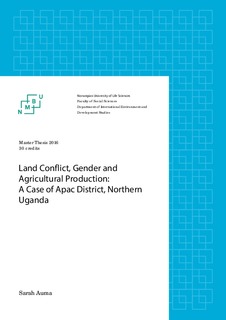Land conflict, gender and agricultural production : a case of Apac district, northern Uganda
Master thesis
Permanent lenke
http://hdl.handle.net/11250/2399028Utgivelsesdato
2016-08-12Metadata
Vis full innførselSamlinger
Sammendrag
This study explores the extent and causes of land conflict at the local community level. It also investigates genders aspects in relation to women position in land holding, transaction and inheritance, and winners and losers in the conflict. Furthermore, the study highlights vulnerable groups that often fall victim of land conflict at the local community and assesses the impacts of such conflicts on the agricultural production, on the social wellbeing of men and women and its effects on the general community. In addition, the study look for local community perception on what could be sustainable solutions to land conflict at the rural community. The results show that land conflict at the local community level is serious and rising which requires action from the authorities to change the situation. The conflict cuts across genders and the vulnerable groups that often fall victim are children born outside marriage especially male children, orphans, widows, divorced and unmarried women. The driving factors for land conflict at the local community are multiple and diverse, ranging from cultural inheritance systems of land holding, self-driven factors such as greed for materials and some weaknesses in the national government. Also, the result indicates that women’s position in land holding and inheritance is gradually improving but their power over land transactions is still greatly low. The finding shows that Children often lose their rights to land due to culture that hinders them from challenging their elders and such instances are attributed to land grabbing. Women often become losers in divorce cases but in genuine cases, where conflict is between a man and woman, and especially when it is attributed to land grabbing, women win the case. The impacts of land conflict can be sighted on the victims through reduced farming land size, declining productivity level and unpleasant life. The impact extends to the general community through increase in dependency level, decline in food security status of the community and rise in illegal practices such as stealing of non-harvested crops. The study concludes that although local practices are blamed for increase incidences of land conflict, some weaknesses in the national government are to a large extent responsible for outbreak of land conflict and that improving women’s access to land will require deep cultural revision with great support from the national government through strong land laws in favor of both gender, coupled with women’s education and economic empowerment.
